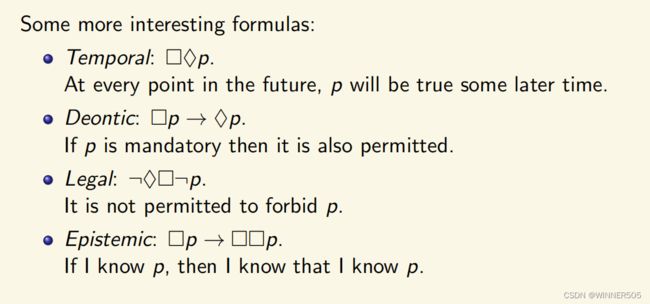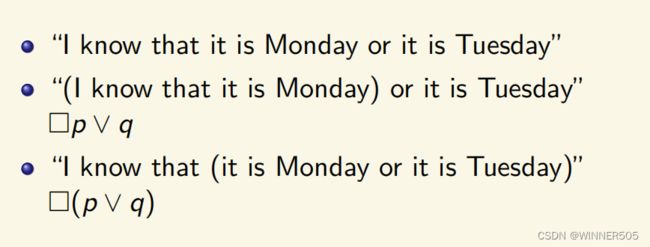【COMP304 LEC4 LEC5】
LEC 4
1. Truth-Functionality
Propositional logic 的connectives(连接词)are truth-functional
但是,有时候的描述不是true-functional的,比如:"Knowing that", "It is necessary that","it is oblligatory that", "It is always the case that".
So we need something other than propositional logic
2. Language of Modal Logic
Language of Propositional Logic:
φ ::= p | ¬ φ | φ ∧ φ
Language of Modal Logic:
φ ::= p | ¬ φ | φ ∧ φ | □ φ
Also ♢ φ abbreviation for ¬ □ ¬ φ .
1. □
The symbol □ has many different meanings!
Alethic □ φ means: “ φ is necessarily true.”
Epistemic □ φ means: “I know that φ is true.”
Doxastic □ φ means: “I believe that φ is true.”
Temporal □ φ means: “At every time in the future, φ will be true.”
Deontic □ φ means: “ φ should be true.”
Legal □ φ means: “ φ is legally required to be true.”
2. ♢
The symbol ♢ has many different meanings!
Alethic ♢ φ means: “ φ is possibly true.”
Epistemic ♢ φ means: “ as far as I know , φ might be true.”
Doxastic ♢ φ means: “I believe that φ might be true.”
Temporal ♢ φ means: “At some time in the future, φ will be true.”
Deontic ♢ φ means: “ φ is allowed to be true.”
Legal ♢ φ means: “it is legal for φ to be true.”
3. Meaning and Context
4. Formal Meaning
LEC 5
2. Language of Modal Logic
5. Stacking operators
Keeping in mind : you can use multiple □ and /or ♢ in a single formula, and they stack
Example: □(□p ∨ ♢□q) is a formula of modal logic
1.Alethic
which means: "It is necessary that either p is necessary or q is possible necessary"
2. epistemic
"I know that I either know p or consider it possible that I know q"




